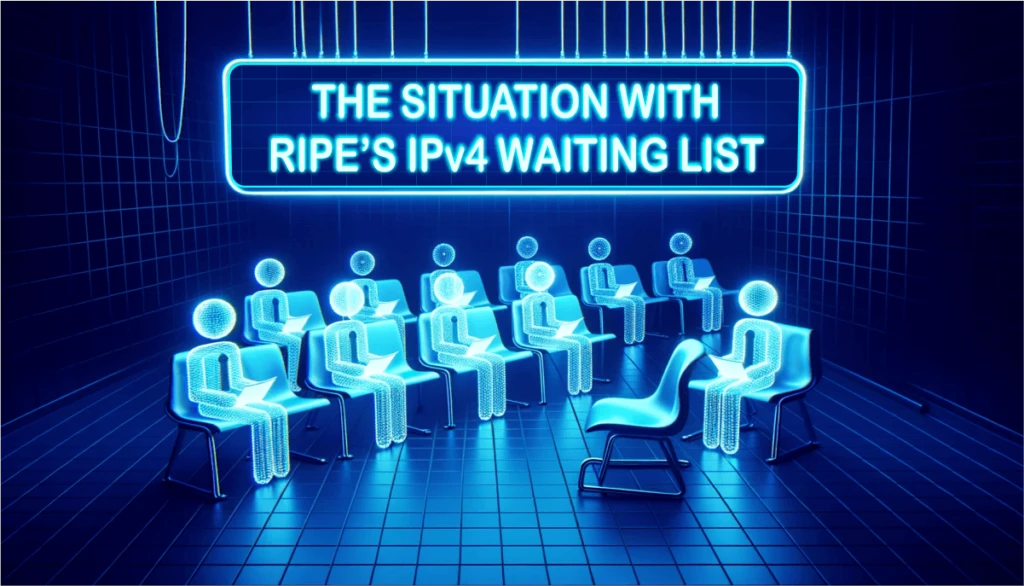The IPv4 market has evolved due to the growing demand and limited supply of IP addresses. This article explores how this market works.
Table of Contents
Understanding IPv4 Addresses
What are IPv4 addresses?
Internet Protocol version 4 (IPv4) addresses are unique identifiers assigned to devices on an IP-based network to facilitate internet communication. An IPv4 address, composed of 32 bits divided into four octets, is typically represented in a dotted-decimal format (e.g., 192.168.0.1). Each octet ranges from 0 to 255, allowing for approximately 4.3 billion unique addresses. These addresses serve as destinations for data packets, enabling accurate routing to the intended device. The size of an IPv4 address block can vary, often being a power of 2, such as 256 addresses (2^8) for a /24 block.
A regional Internet registry (RIR) is an organization that manages the allocation and registration of IP addresses within a region of the world.
Classification of IPv4 addresses
IPv4 addresses are classified into five classes: A, B, C, D, and E. Each class has a specific range of addresses reserved for different purposes, such as public or private networks. Class A addresses are used for large networks, Class B for medium-sized networks, and Class C for small networks. Class D is used for multicast groups, and Class E is reserved for future use or research and development purposes.
IPv4 Address Exhaustion

The rapid growth of the internet and the increasing number of digital devices have led to a shortage of available IP addresses. This phenomenon, known as IPv4 address exhaustion, has been a concern since the 1980s, leading to the development of various techniques to extend the life of IPv4, such as subnetting, Classless Inter-Domain Routing (CIDR), and Network Address Translation (NAT). Understanding the challenges caused by IPv4 address scarcity is essential for individuals and organizations involved in networking.
The Market for IP Addresses
Overview of the IP address market
The IP address market involves the transfer of limited IP addresses from one organization to another. IP Brokers connect sellers and buyers, with prices determined by demand, availability, block size, and region.
The IP address market operates much like any other market with supply and demand dynamics. The supply comes from organizations that have unused or underutilized IP addresses, while the demand comes from organizations that need additional IP addresses to grow their networks. The price of IP addresses in this market can fluctuate based on these supply and demand dynamics, as well as other factors such as the reputation of the IP addresses and the size of the address block.
Transfer of IP addresses
The transfer of IP addresses involves transferring rights of exclusive use of IP addresses from the seller to the buyer. Organizations can sell their surplus addresses, while others can purchase them. Qualified IP Brokers like Alpha Infola usually facilitate these transactions.
The process of transferring IP addresses typically involves several steps.
- First, the buyer and seller agree on the terms of the sale, including the price and the size of the address block.
- Next, the seller submits a transfer request to the relevant RIR, providing the necessary documentation to prove that they are the rightful owners of the addresses.
- The RIR then reviews the request and, if approved, updates the registry to reflect the buyer as the new owner of the addresses.
Factors Influencing the IPv4 Market
Key factors in the IPv4 market include:
1. IP address pricing
The cost of IPv4 addresses can vary significantly depending on several factors. These include the demand in the marketplace, block size, and reputation:
- Demand: As the supply of IPv4 addresses becomes more limited, the cost tends to increase. Global macroeconomic conditions also play a huge role in this factor.
- Block Size: Larger contiguous blocks tend to be more valuable than smaller blocks or fragmented blocks.
- Reputation: The price of IP addresses can be influenced by the reputation of the addresses. For example, addresses that have been involved in spamming or other malicious activities may have a poor reputation and may be less valuable in the market.
It’s important to note that the IP address market can be somewhat opaque, with prices not publicly available or varying widely. This lack of transparency can make it challenging to understand the fair market value of IP addresses. To navigate this, potential buyers can get in touch with the team at Alpha Infolab. We are here to guide you through this process. With our deep understanding of the current market dynamics, we can provide you with guidance on current market prices and help you navigate the complexities of the IP address market.
2. IPv4 transfer policies and regulations
IP transfer policies and regulations govern the transfer of IP addresses between organizations. The policies are defined by Regional Internet Registries (RIRs) and require organizations to demonstrate a justified need for the addresses and comply with regional boundaries.
Each RIR has its own transfer policies and procedures, so it’s important to understand the rules of the relevant RIR before proceeding with a transaction. Some RIRs require the buyer to demonstrate a need for the addresses, while others have more relaxed policies.
To further understand these procedures, here are detailed transfer processes:
- For APNIC: APNIC IPv4 transfer process
- For ARIN: ARIN IPv4 transfer process
- For RIPE NCC: RIPE IPv4 transfer process
By familiarizing yourself with these processes, you can ensure a smoother and more compliant transfer.
Key Takeaways
What are IPv4 addresses?
IPv4 addresses are unique identifiers assigned to devices on an IP-based network to facilitate internet communication. They are composed of 32 bits divided into four octets and are represented in a dotted-decimal format (e.g., 192.168.0.1).
What led to the phenomenon known as IPv4 address exhaustion?
The rapid growth of the internet and the increasing number of digital devices have led to a shortage of available IP addresses. This phenomenon, known as IPv4 address exhaustion, has been a concern since the 1980s.
How does the IP address market operate?
The IP address market involves the transfer of limited IP addresses from one organization to another. IP Brokers connect sellers and buyers, with prices determined by factors such as demand, availability, block size, and region.
What are the key factors influencing the IPv4 market?
The main factors include IP Address Pricing, which can vary based on demand, block size, and reputation, and IPv4 Transfer Policies and Regulations, which are defined by Regional Internet Registries (RIRs) and govern the transfer of IP addresses between organizations.
Can I purchase an IP address from a different country?
Yes, the IPv4 market allows organizations to buy IP addresses from various regions, depending on availability and regional internet registries.
What factors should I consider when selecting an IPv4 lease provider?
Consider their reputation, pricing, contract terms, and the range of services they offer to ensure a secure and efficient leasing experience. Learn more at How do I choose an IPv4 lease provider?





